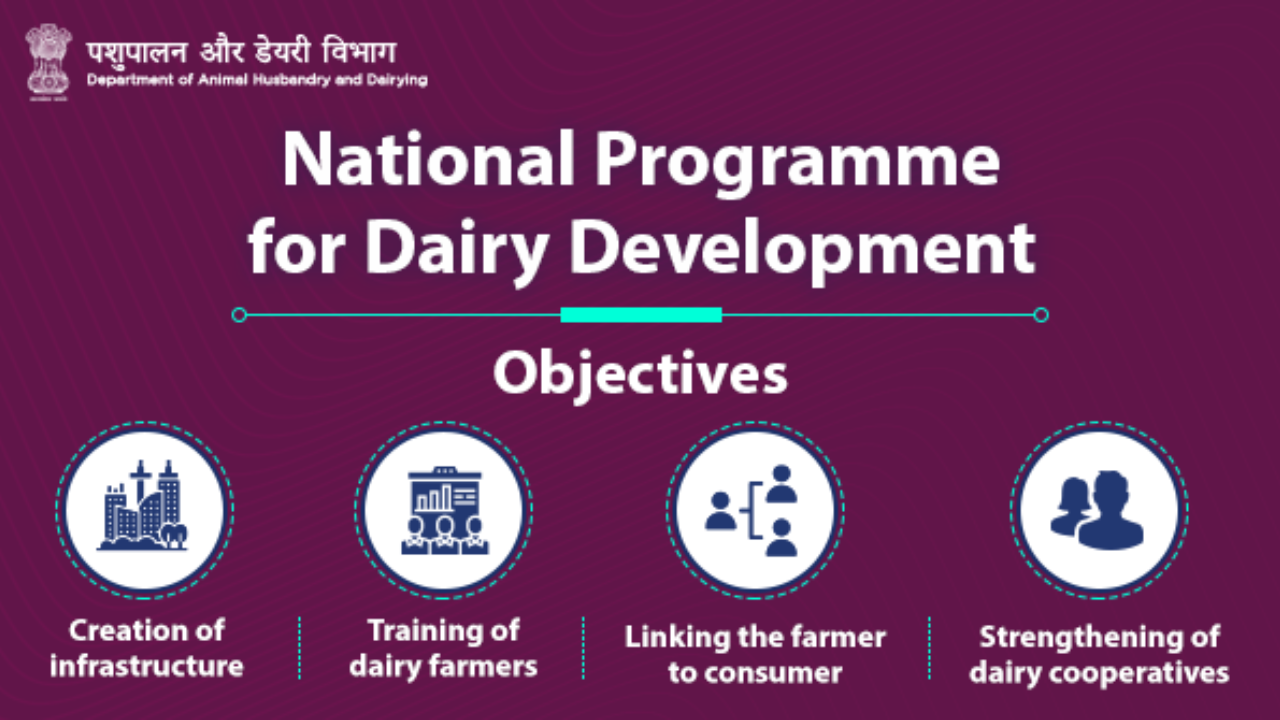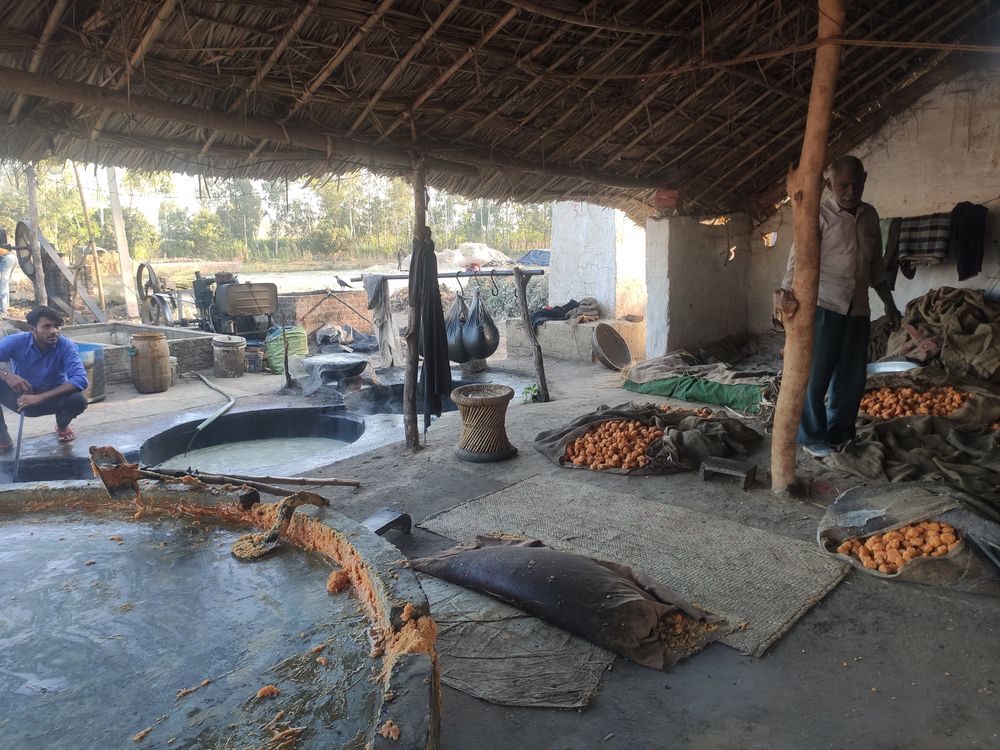Introduction:
- The National Programme for Dairy Development (NPDD) stands as a beacon of India's concerted efforts towards fostering the growth and development of its dairy sector. Established with the aim of enhancing milk production, augmenting rural livelihoods, and ensuring the availability of quality dairy products across the nation, NPDD has emerged as a cornerstone of India's agricultural and economic policies. This comprehensive program encompasses a wide array of initiatives aimed at bolstering every aspect of the dairy industry, from animal husbandry practices to milk processing and distribution. In this article, we delve into the intricacies of NPDD, its objectives, implementation strategies, impact, and frequently asked questions (FAQs) to provide a comprehensive understanding of this vital initiative.
Objectives of NPDD:
- Enhanced Milk Production: One of the primary objectives of NPDD is to increase milk production across the country through improved animal husbandry practices, breed enhancement, and better management techniques.
- Rural Livelihood Development: NPDD aims to uplift rural livelihoods by providing income-generating opportunities to farmers through dairy farming, thereby contributing to poverty alleviation and rural prosperity.
- Infrastructure Development: The program focuses on developing robust dairy infrastructure, including milk collection centers, processing plants, cold storage facilities, and transportation networks, to ensure efficient milk procurement, storage, and distribution.
- Quality Assurance: NPDD emphasizes the importance of maintaining high-quality standards in milk production, processing, and distribution to safeguard consumer health and promote trust in dairy products.
- Technology Adoption: Encouraging the adoption of modern technologies and best practices in dairy farming and milk processing is another key objective of NPDD to enhance productivity and efficiency in the dairy sector.
Official Website: https://dahd.nic.in/schemes/programmes/npdd
Implementation Strategies:
- Financial Support: NPDD provides financial assistance to dairy farmers, cooperatives, and entrepreneurs through subsidies, loans, and grants to invest in infrastructure, procure high-yielding cattle breeds, and adopt modern dairy farming practices.
- Capacity Building: The program conducts training and extension activities to impart technical knowledge and skills to dairy farmers, veterinarians, and other stakeholders to improve animal husbandry practices, fodder management, and dairy processing techniques.
- Research and Development: NPDD supports research and development initiatives aimed at developing indigenous technologies, breeding programs, and disease management strategies tailored to the needs of Indian dairy farmers.
- Market Linkages: Facilitating market linkages and providing marketing support to dairy cooperatives and farmers' groups enable them to fetch better prices for their milk and dairy products, thereby enhancing their income and market competitiveness.
- Policy Support: The program advocates for favorable policy frameworks and regulatory reforms to address challenges faced by the dairy sector and create an enabling environment for its sustainable growth and development.
Impact/Benefits of NPDD:
- Increased Milk Production: NPDD has contributed significantly to the growth of India's milk production, making it the largest milk-producing country globally and transforming millions of smallholder farmers into dairy entrepreneurs.
- Rural Empowerment: By providing income-generating opportunities and improving rural livelihoods, NPDD has played a crucial role in empowering rural communities, particularly women, who are actively involved in dairy farming and related activities.
- Infrastructure Development: The program's focus on developing dairy infrastructure has led to the establishment of thousands of milk collection centers, processing plants, and cold storage facilities, facilitating efficient milk procurement, storage, and distribution.
- Quality Assurance: NPDD's emphasis on quality standards has led to improved hygiene and safety practices in milk production and processing, ensuring the delivery of safe and nutritious dairy products to consumers.
- Technology Adoption: The adoption of modern technologies and best practices promoted by NPDD has enhanced productivity, efficiency, and sustainability in the dairy sector, benefiting farmers and consumers alike.
- Market Access and Price Stabilization: NPDD facilitates market linkages and provides marketing support to dairy cooperatives and farmers' groups, enabling them to access broader markets and fetch better prices for their milk and dairy products. This not only improves the income of dairy farmers but also stabilizes milk prices, benefiting both producers and consumers.
- Environmental Sustainability: NPDD promotes sustainable dairy farming practices such as fodder cultivation, waste management, and renewable energy adoption to minimize environmental impact and ensure the long-term viability of the dairy sector. By promoting eco-friendly practices, NPDD contributes to environmental conservation and sustainable development.
Conclusion:
- In conclusion, the National Programme for Dairy Development (NPDD) stands as a testament to India's commitment to fostering the growth and sustainability of its dairy sector. Through its multifaceted initiatives, NPDD has not only propelled India to the forefront of global milk production but has also empowered millions of rural households, enhanced infrastructure, ensured quality standards, and fostered technological innovation, thereby laying the foundation for a vibrant and prosperous dairy industry in the country.
Frequently Asked Questions:
When was the NPDD scheme launched?
- The Department of Animal Husbandry & Dairying (DAHD) has been implementing the "National Programme for Dairy Development (NPDD)" scheme across the country since February 2014.
What is National Programme for dairy Development?
- The NPDD scheme aims to improve the quality of milk and milk products while also increasing the proportion of organized milk procurement.
What is the duration of NPDD?
- Under the NPDD scheme, projects are typically approved for one to three years. Approved funds are released to States/Union Territories (UTs) in installments based on the submission of Audited Accounts, Utilization Certificates, and the physical and financial progress of previously released amounts.
What is the national dairy development policy?
- The National Action Plan for Dairy Development aims to reach a milk production target of 254.5 million MT by 2022 and 300 million MT by 2023-24, up from 155.5 million MT during 2015-16. This requires an annual growth rate of 8.56%, which would lead to an increase in per capita availability of milk from the current level of 337 grams.
Where is the headquarter of National Dairy Development Board?
- The headquarters of the National Dairy Development Board (NDDB) is located in Anand, Gujarat, India.
What is the role of dairy cooperatives in NPDD?
- Dairy cooperatives play a pivotal role in NPDD by mobilizing farmers into organized groups, providing them with access to markets, credit, and technical support, and ensuring fair returns for their milk.
How does NPDD address environmental sustainability in dairy farming?
- NPDD promotes sustainable dairy farming practices such as fodder cultivation, waste management, and renewable energy adoption to minimize environmental impact and ensure the long-term viability of the dairy sector.
What are the key challenges faced by NPDD in its implementation?
- Some of the key challenges faced by NPDD include inadequate infrastructure, limited access to credit and technology, fluctuations in milk prices, and animal health issues such as diseases and feed scarcity.
How can smallholder dairy farmers benefit from NPDD?
- NPDD offers various support mechanisms such as subsidies, training, and market linkages to smallholder dairy farmers to enhance their productivity, income, and overall well-being.
What role can youth play in the dairy sector under NPDD?
- Youth can actively participate in the dairy sector by engaging in dairy entrepreneurship, adopting innovative technologies, and participating in value-added dairy product development, thereby contributing to its growth and modernization.
We hope that you like this content and for more such content Please follow us on our social site and YouTube and subscribe to our website.
Manage your business cash flows and payable/receivables using our Bahi Khata App


